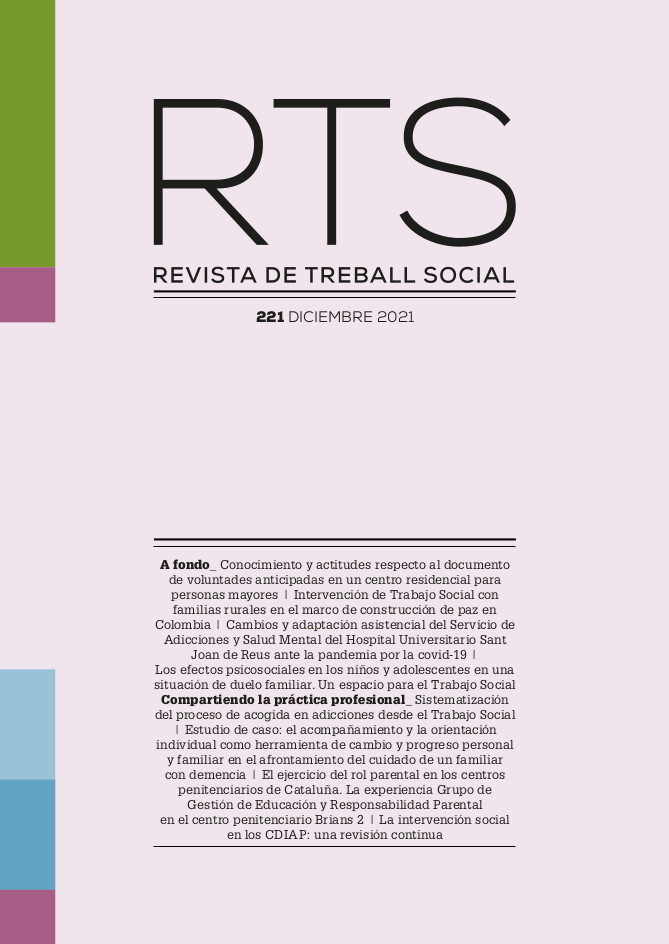This study seeks to examine the level of knowledge concerning the advance directive document (ADD) that is held by the workers and residents of a care home, along with their attitudes towards it. To do this, a theoretical approach to concepts related to the ADD has been put forward. These concepts are: prevalence, use, knowledge and attitude in relation to the document on the part of care staff and the role of social work in this respect. The methodological framework is conceived around interviews with various professionals from the care home and a focus group with the participation of residents from the home. The study also engages in interviews with professionals from the sphere of social and educational action with the elderly, deemed as points of reference in this field. The analysis of the results highlights the lack of knowledge of the ADD shown by professionals and residents of the home, although they do exhibit a positive attitude towards the document, and both groups expressed a need for training in this sphere and for the ADD to be incorporated into the home as a decisive component in administering the right to die with dignity.
Article
Knowledge and attitudes concerning the advance directive document at a care home
Aguilar-Sánchez, J. M., Cabañero-Martínez, M. J., Puerta-Fernández, F., Ladios-Martín, M., Fernández-de-Maya, J., y Cabrero-García., J. (2018). Grado de conocimiento y actitudes de los profesionales sanitarios sobre el documento de voluntades anticipadas. Gaceta Sanitaria, 32(4), 339-345. Scielo. https://scielo.isciii.es/pdf/gs/v32n4/0213-9111-gs-32-04-339.pdf
Bachiller, A. (2004). Testamento vital: la opinion médica en la provincia de Valladolid. Metas de Enfermería, 7(4), 24-7.
Barbour, R. (2013). Los grupos de discusión en investigación cualitativa. Ediciones Morata.
Batchelor, P., Haralambous, B,. Nolte, L., Mackell, P., Fearn, M., Hwang, K. Detering, K. (2017). Advance Care Planning: Aged Care Implementation Guide. Austin Health, Melbourne. Recuperado 18 febrero 2020, de https://www.advancecareplanning.org.au/docs/default-source/acpa-resource...
Beauchamp., T. L., y Childress, J. F. (1979). Principles of biomedical ethics. Oxford University Press.
Bern-Klug, M., Gessert, C., y Forbes, S. (2001). The need to revise assumptions about the end of life: Implications for social work practice. Health & Social Work, 26(1), 38-47.
Colom, D. (2008). El trabajo social sanitario. Siglo XXI.
Comité de Bioética de Cataluña. (2010). Consideracions sobre el document de voluntats anticipades. Departamento de Salud de la Generalidad de Cataluña. Recuperado 16 enero 2020, de http://canalsalut.gencat.cat/web/.content/_A-Z/V/voluntats_anticipades/d...
Decreto 175/2002, de 25 de junio, por el que se regula el Registro de voluntades anticipadas. DOGC núm. 3665 (2002).
Hanzeliková, A. (2016). Introducción a la investigación sociosanitaria: Diseño de estudios cualitativos características generales y conceptos básicos de la investigación cualitativa. Enfermería en Cardiología, 23(68), 25-29. Enfermería en Cardiología. https://www.enfermeriaencardiologia.com/wp-content/uploads/68_01.pdf
Hildén, H. M., Louhiala, P., y Palo, P. (2004). End of Life Decisions: Attitudes of Finnish Physicians. Journal of Medical Ethics, 30(4), 5-362.
Ley Orgánica 6/2006, de 19 de julio, de reforma del Estatuto de Autonomía de Cataluña. BOE núm. 172 (2006).
Ley Orgánica 3/2018, de 5 de diciembre, de protección de datos personales y garantía de los derechos digitales. BOE núm. 294 (2018).
Ley 21/2000, de 29 de diciembre, sobre los derechos de información concernientes a la salud y a la autonomía del paciente, y la documentación clínica. DOGC núm. 3303 (2001).
Ley 41/2002, de 14 de noviembre, básica reguladora de la autonomía del paciente y de derechos y obligaciones en materia de información y documentación clínica. BOE núm. 274 (2002).
Luptak, M. (2004). Social work and end-of-life care for older people: A historical perspective. Health & Social Work, 29(1), 7-15.
Martínez, K. (2007). Los documentos de voluntades anticipadas. Anales del Sistema Sanitario de Navarra, 30 (Supl. 3), 87-102.
Morgan, S., y Yoder, L. (2012). A concept analysis of person-centred care. Journal of Holistic Nursing, 30(1), 6-15.
Mouton, C., Teno, J. M., Mor, V., y Piette, J. (1997). Communication of Preference of Care Among Human Immunodeficiency Virus-Infected Patients. Arch Fam Med. 6(4), 7-342.
Sanz-Ortiz, J. (2006). ¿Es posible gestionar el proceso de morir? Voluntades anticipadas. Medicina Clínica, 126(16), 3-620.
Saralegui, I., Monzón, J. L., y Martín, M. C. (2004). Instrucciones previas en medicina intensiva. Medicina Intensiva, 28(5), 61-256.
Simón, P., Tamayo, M. I., Vázquez, A., Durán, A., Pena, J., y Jiménez, P. (2008). Conocimientos y actitudes de los médicos en dos áreas sanitarias sobre las voluntades vitales anticipadas. Atención Primaria, 40(2), 6-61.
Taylor, S. y Bogdan, R. C. (1987). Introducción a los métodos cualitativos de investigación. Paidós.
Velasco, T. R., y Rayón, E. (2016). Instrucciones previas en cuidados intensivos: competencias de los profesionales sanitarios. Medicina Intensiva, 40(3), 62-154.
Wenger, N. S., Kanouse, D. E., y Collins, R. L. (2001). End-of-life discussions and preference among persons with HIV. JAMA, 285(22), 7-2880.





